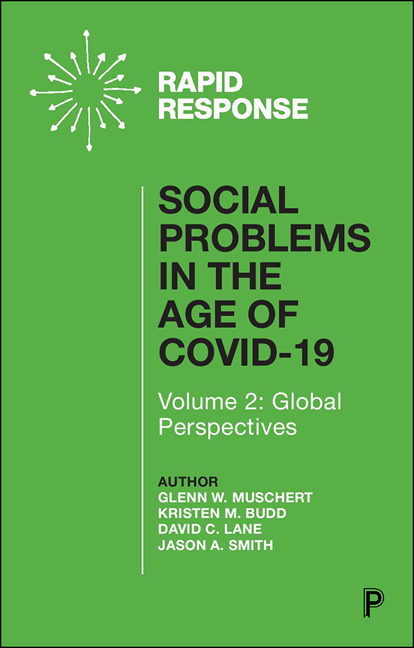Book contents
- Frontmatter
- Contents
- Acknowledgments
- Presidential Welcome
- Editorial Introduction
- 1 Isolation, Economic Desperation, and Exploitation: Human Trafficking and the COVID-19 Crisis
- 2 Uncertainty and Disruption in the Transition to Adulthood During COVID-19
- 3 Disability Rights and Healthcare Rationing during COVID-19
- 4 Social-Distancing the Settler-State: Indigenous Peoples in the Age of COVID-19
- 5 The Pandemic and the Invisible Poor of the Global South: Slum Dwellers in Mumbai, India and Dhaka, Bangladesh
- 6 The Human Right to Water and Sanitation in the Age of COVID-19
- 7 Pandemic Perils of Migrant Workers: Inequalities Intensified
- 8 Food Insecurity and COVID-19
- 9 Protecting Refugee Health and Human Rights in the Context of the COVID-19 Pandemic: Challenges and Pathways to Justice
- 10 COVID-19 Requires an Intersectional Feminist Policy Response
- End Matter
- Afterword
- Index
7 - Pandemic Perils of Migrant Workers: Inequalities Intensified
Published online by Cambridge University Press: 23 March 2021
- Frontmatter
- Contents
- Acknowledgments
- Presidential Welcome
- Editorial Introduction
- 1 Isolation, Economic Desperation, and Exploitation: Human Trafficking and the COVID-19 Crisis
- 2 Uncertainty and Disruption in the Transition to Adulthood During COVID-19
- 3 Disability Rights and Healthcare Rationing during COVID-19
- 4 Social-Distancing the Settler-State: Indigenous Peoples in the Age of COVID-19
- 5 The Pandemic and the Invisible Poor of the Global South: Slum Dwellers in Mumbai, India and Dhaka, Bangladesh
- 6 The Human Right to Water and Sanitation in the Age of COVID-19
- 7 Pandemic Perils of Migrant Workers: Inequalities Intensified
- 8 Food Insecurity and COVID-19
- 9 Protecting Refugee Health and Human Rights in the Context of the COVID-19 Pandemic: Challenges and Pathways to Justice
- 10 COVID-19 Requires an Intersectional Feminist Policy Response
- End Matter
- Afterword
- Index
Summary
The Problem
The COVID-19 crisis has thrown into relief the position of migrant workers as “second class citizens,” a colloquialism loosely used to connote segments of a populace who simultaneously belong and do not belong. The strange dichotomy of citizen and non-citizen ignores contributions legal migrants make, such as leadership of corporations and nonprofit organizations, scientific and academic research, and athletics. Despite often possessing burgeoning bank accounts, migrants feel that their statuses within a foreign society are lower by virtue of their nationality, ethnicity, skin color, and other factors. Many experience lower socioeconomic statuses and are subject to poor working conditions in an exploitative political economy. The COVID-19 crisis has put migrants’ lives into disarray and exposed rampant institutional inequalities that contribute to their vulnerability.
A “migrant worker” may be defined as a person who is to be, or is or has been, engaged in a remunerated activity in a state of which he or she is not a national. The term “migrant worker” will be used broadly to denote international migrants (those who have moved between countries) and internal migrants (those who move between states of the same country), as well as return migrants (those who may be seasonal workers or have lost employment and have returned to their home). Migration trends typically involve workers moving from a lower income to higher income country to plug talent gaps by providing skilled labor or to engage in unskilled labor, which local populations sometimes find demeaning work. Many low-skilled migrants are employed without social protections, formal contracts, or workplace protections, and are vulnerable to job loss or pay cuts without recourse to legal aid. Migrants are subject to xenophobia, racial, ethnic, or other forms of discrimination, and often are dependent on employers for residence and visa statuses.
COVID-19 has driven global economies, companies, and workers into a crisis of unprecedented proportions. The ILO indicates 258 million international migrants and 164 million international migrant workers worldwide and UNDESA estimates that almost 20 percent of migrants may be irregular. In many countries they form a large share of the frontline workforce, exposed to COVID-19 risk through essential jobs in healthcare, services, transport, construction, agriculture, and food processing.
- Type
- Chapter
- Information
- Social Problems in the Age of COVID-19 Vol 2Volume 2: Global Perspectives, pp. 73 - 86Publisher: Bristol University PressPrint publication year: 2020



